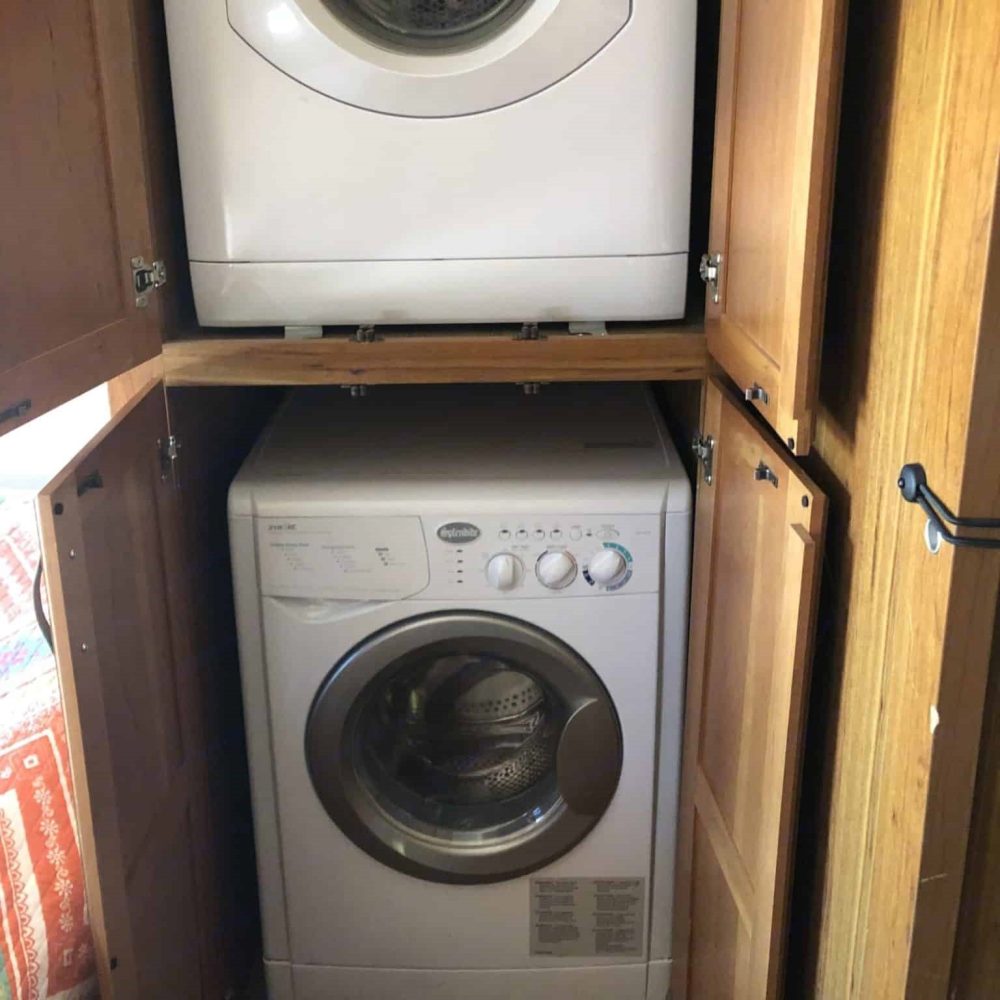Introduction
Traveling in an RV or camper offers unparalleled freedom and adventure, yet it comes with its unique set of challenges—one of which is managing laundry. When you’re out in the wild, having the right camper washer and dryer can make all the difference. Whether you’re boondocking in a remote location or parked at an RV site with full hookups, the right washing solution should accommodate your needs. In this comprehensive guide, we’ll explore the intricacies of choosing a camper washer and dryer that suits your traveling lifestyle, addressing the differences between off-grid and plugged-in models and providing practical tips to enhance your laundry experience on the road.
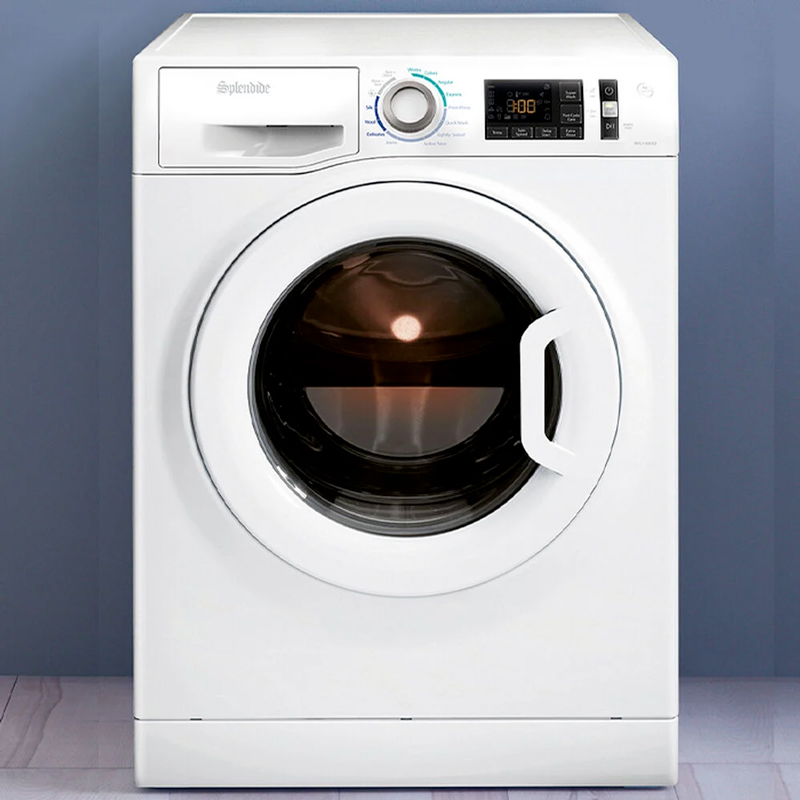 Understanding Space Limitations in RVs
Understanding Space Limitations in RVs
One of the most significant considerations when choosing a camper washer and dryer is the limited space in RVs. RVs differ in size and type, impacting the specifications of appliances that can be fitted inside. First and foremost, portable washers and dryers are often the most practical choice for RV living due to their compact sizes and lighter weights.
Portable vs. Compact Models
Portable washer and dryer units like the Splendide WD2100 have dimensions that often allow them to fit in modestly sized areas, making them perfect for smaller RVs and campers. Typically, these models do not require as much water or power as traditional units, making them an excellent choice.
Compact washer and dryer models such as the GE Profile are designed for maximum efficiency while retaining a slim profile. While they may take up slightly more space than a portable unit, their drying capabilities often surpass portable options.
In light of this, understanding the exact measurements of your available laundry space is essential to make an informed choice. Taking the time to measure the area ensures that the model you choose fits properly without compromising movement or storage in your RV.
Power Considerations: 12V vs. 110V
When selecting a washer and dryer combo for your RV, power consumption is another crucial factor. Many portable units operate on a 12V system, allowing them to run off the RV’s battery. This feature is particularly advantageous during off-grid camping trips where 110V AC power may not be readily available.
Understanding Power Requirements
For example, the Splendide WD2100 operates on a standard 110V outlet, making it advantageous for use at campsites with electrical hookups. On the other hand, if you frequently travel to more remote locations, investing in a portable unit like the one with a 12V configuration could save you the hassle of seeking a power outlet.
As you plan your travels, consider your camping style and available power options. Additionally, a unit that offers both options can provide valuable flexibility, allowing you to adapt to different scenarios and environments.
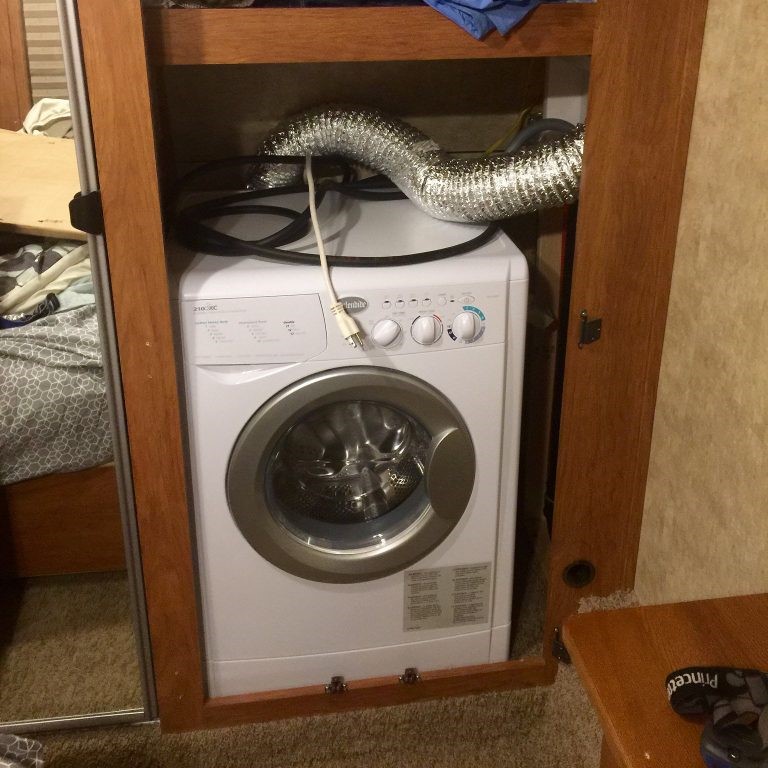 Off-Grid vs. Plugged-In Power Sources
Off-Grid vs. Plugged-In Power Sources
Understanding how your camper washer and dryer interfaces with its power source is vital. There are two primary power options: off-grid power utilizing solar or battery systems and plugged-in power through electrical campsites. Each option has its unique benefits and challenges.
Off-Grid Power Compatibility
Off-grid or solar-compatible washers, like the Laveo Dry Flush, are designed to operate efficiently without needing a traditional power outlet. These systems usually incorporate features that optimize energy consumption, such as advanced lithium-ion batteries designed to sustain operations during extended periods away from traditional electrical sources.
Energy Consumption Analysis
- Lithium Battery Capacity: Off-grid models rely heavily on battery capacity. Typically, a lithium battery can support smaller energy demands and thus allows for laundry cycles without depleting your power supply too quickly.
- Heat Pump Technology: Many energy-efficient washers use heat pump technology to dry clothes, reducing energy consumption significantly compared to traditional dryers. This technology works by recycling heat produced during the drying process, making it particularly efficient for off-grid living.
Plugged-In Power Options
In contrast, traditional plugged-in units are straightforward: they draw power directly from the electrical supply at RV parks and campsites.
Advantages of Plugged-In Appliances:
- High wattage: They usually offer higher drying and washing capacities due to their ability to use more energy.
- Faster cycle times: Plugged-in models can generally complete laundry loads faster than off-grid options.
- User-friendly: They fit into the most common residential standards of operation, making them easy to use without needing to adapt anything.
When selecting between these two options, consider your travel habits, whether you often camp in remote areas or stay in parks with full electrical hookups.
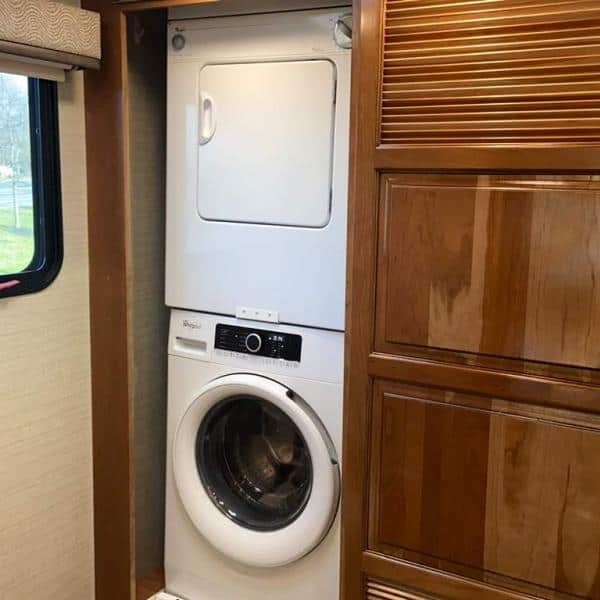 Managing Laundry Loads While Off-Grid
Managing Laundry Loads While Off-Grid
Navigating laundry needs while off-grid requires careful management of your washing loads. Here are some practical tips to control laundry amounts:
- Plan Ahead: Before your travels, consider packing a limited selection of clothing items that will mix and match easily. Less clothing means fewer loads of laundry.
- Do Laundry Frequently: It may seem counterintuitive, but washing smaller loads of laundry more often will help you manage energy consumption more effectively.
- Limit Water Usage: Off-grid systems often utilize low water consumption cycles. Choose quick wash cycles and avoid filling the tub more than necessary.
By following these guidelines, you can optimize your laundry routine without overburdening your energy supply while off-grid.
Integrating Your Washer and Dryer into Your RV Design
For RV owners, the integration of the camper washer and dryer into your living space can significantly enhance usability. Thoughtful design choices can make the unit both functional and convenient.
Modifying Storage Solutions
Consider transforming a storage cabinet into a dedicated laundry space. By removing unnecessary shelves and customizing the cabinet’s interior layout, you can create a functional area to house your washer and dryer.
Installing Foldable Brackets
Using foldable stands allows you to secure the washer and dryer in a space-saving manner. These brackets can easily be folded away when not in use, freeing up space in your RV.
Protecting Against Freezing
When planning for winter travels, installing insulation around your drainage pipes can prevent freezing issues. This step is critical for areas where temperatures drop significantly, ensuring your camper washer and dryer remains functional.
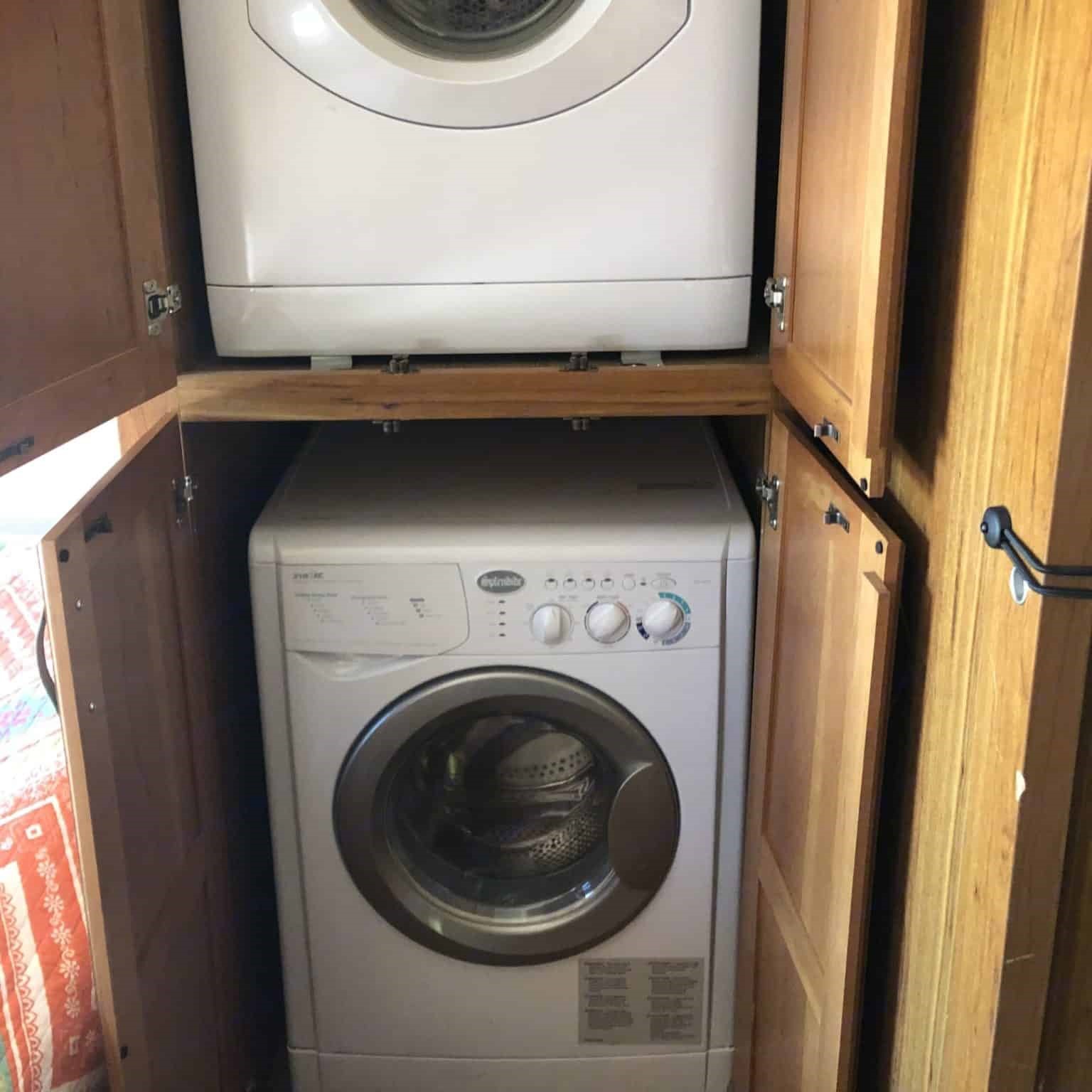 Safety Considerations: Weight Distribution and Stability
Safety Considerations: Weight Distribution and Stability
It is vital to consider the weight balance when installing appliances in your RV. Installation of a camper washer and dryer can shift the weight distribution within the vehicle, leading to potential safety hazards while driving.
Balancing Weight Distribution
Consult RV modification experts who can provide insight and recommendations on how best to distribute the weight of your new appliances, ensuring that they do not compromise the vehicle’s safety. Many RV enthusiasts recommend that heavier items be placed low and toward the vehicle’s center to maintain stability on the road.
Essential Maintenance Tips for Your Camper Washer and Dryer
To ensure that your camper washer and dryer remains in good working order, regular maintenance is essential. Perform these tasks to extend the appliance’s lifespan and prevent common issues.
Cleaning the Lint Filter
Start with routine cleaning of the lint filter. Regularly cleaning the filter, at least after each use, can help prevent potential fire hazards caused by lint accumulation. Perform a quick visual check to ensure it’s free from debris.
Lubricating Drum Bearings
To keep your washer running smoothly, it’s essential to lubricate the drum bearings. Use a lubricant designed for dryer components, and apply it every six months or as needed to avoid any noise or wear issues.
Winterizing and Drainage Prevention
As winter approaches, remember to drain your washing machine if you’re traveling through colder regions. To prevent freezing, ensure that all hoses are clear of water.
Emergency Solutions: Handling Common Issues
Sometimes, issues arise unexpectedly. Being prepared with a plan can save you from extensive downtime.
Addressing Leaks
If you encounter a leak, turn off the water supply immediately. Inspect the hoses for cracks or nipple issues and replace as necessary. Always keep a spare hose on hand for quick fixes.
Dealing with Power Outages
If you unexpectedly experience power outages while using your RV washer and dryer, you can switch to battery power if available. Additionally, prioritize laundry loads based on need; items that are essential should be washed first, while less critical pieces may wait until power is restored.
Camper Washer and Dryer vs. Laundromat: Which to Choose?
For those fully embracing RV life, you most likely weigh the benefits of owning a camper washer and dryer against using laundromats available on the road. While laundromats might seem convenient, there are several factors to consider.
Time Cost
Laundromats introduce wait times—be it for machines or for folding space. Planning and executing laundry can take hours, potentially cutting into precious travel time. Owning your unit affords you the convenience of washing on your schedule, avoiding waits altogether.
Economic Cost
There’s a considerable difference in operational costs. Laundromat fees can quickly add up, especially if you travel frequently. Owning a camper washer and dryer means you’ll have to analyze the upfront costs vs. potential savings over time, particularly if you use your appliance regularly.
Convenience
The convenience of being able to wash clothes whenever you want cannot be overstated. Having your unit onboard means you can wash clothes no matter where you are, essential for handling laundry during extreme weather when laundromats are less accessible.
Cleaning Efficiency
Finally, in situations of extreme weather, such as serious rain or snow, you may find accessibility to laundromats severely hampered. Having your own camper washer and dryer allows you to wash clothes regardless of conditions.
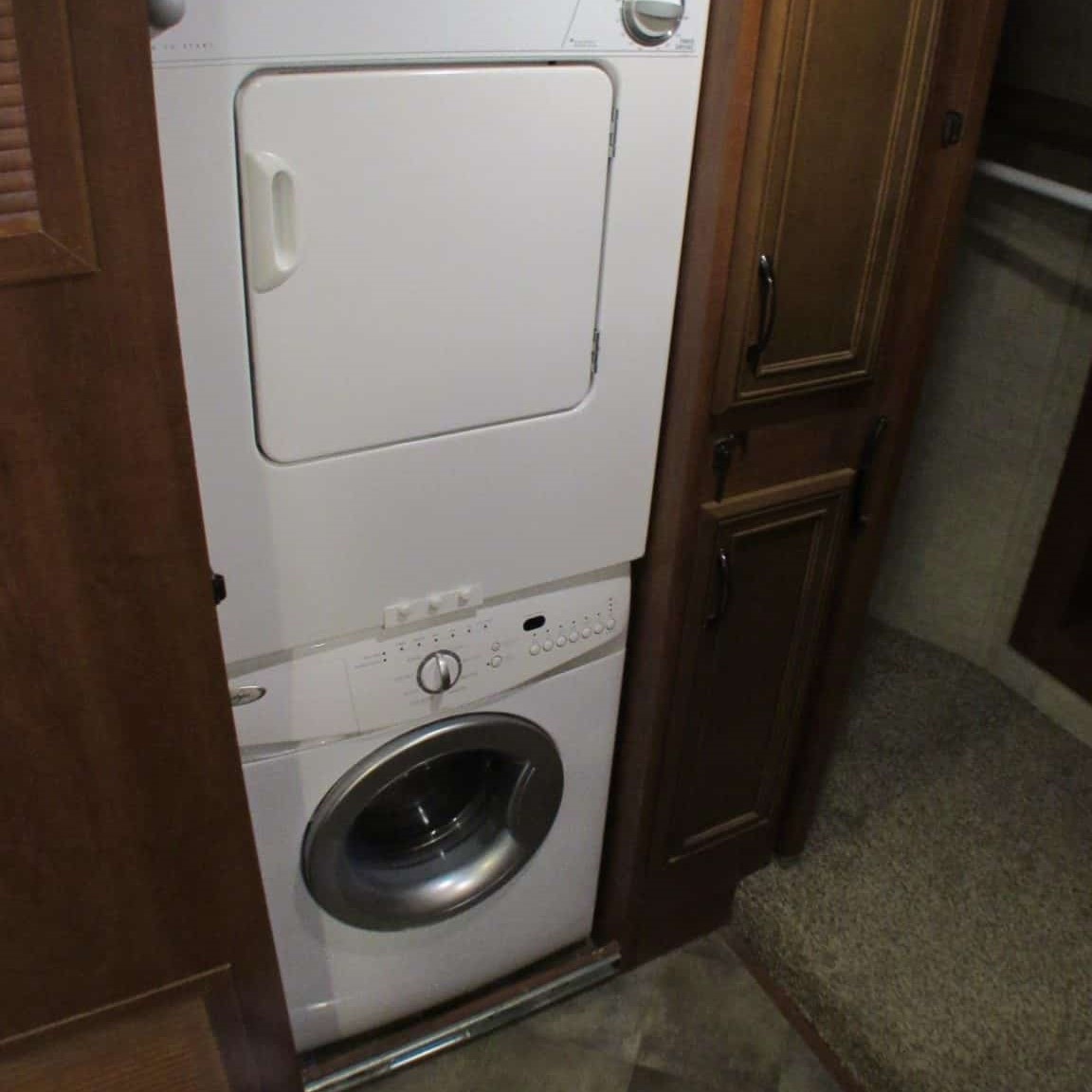 Conclusion
Conclusion
Selecting the ideal camper washer and dryer combines elements of space, energy management, and personal preference. By understanding how off-grid and plugged-in models operate and evaluating your unique travel needs, you will be able to make informed decisions.
Whether you decide on a portable model like the Laveo Dry Flush for off-grid journeys or a traditional plugged-in model for your camping site, knowing the advantages and limitations of each will ensure your laundry experience meets your expectations.
Ultimately, the right camper washer and dryer can significantly simplify your laundry duties while enhancing your overall RV lifestyle. With effective planning and a little creativity, you can travel freely, knowing your laundry is taken care of, no matter the situation.

